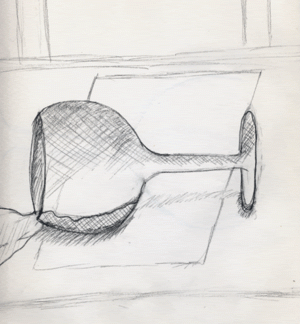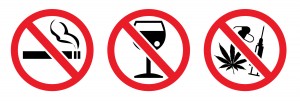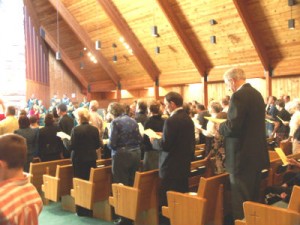Dulcinea’s Video Testimony: Depression, Porn, Anger, Same Sex Attraction
Dulcinea’s Video Testimony: Depression, Porn, Anger, Same Sex Attraction Read More »
 I am more powerful than all the combined armies of the world.
I am more powerful than all the combined armies of the world.
I have destroyed more men than all the wars of the nations.
I have caused millions of accidents and wrecked more homes
than all the floods, tornadoes and hurricanes put together.
I am the world’s slickest thief,
I steal billions of dollars each year.
I find my victims among the sick and poor alike,
the young, the strong and the weak.
Every substance abuse counselor has probably at one time or another pointed to the “skid row bum” and said, “You don’t have to be like him to be an addict or alcoholic! ” While this type of person may represent only 5% of all addicts, Christians who are in recovery have a lot more in common with him than they may think!

A drive through the streets of any major city reminds us that the “skid row bum” has not disappeared. Alarmingly, he has been joined by hundreds of thousands of people now called “the homeless. ” Who are they? 18-35 year old men, women who are 16-30 years of age, and single parents with children now represent the bulk of the homeless population. Most are minorities and local people, not transients, who have been homeless for one year or less. On today’s “skid row” we find people who are dependent on a variety of drugs, emotionally dysfunctional, mentally ill, and medically at-risk, especially for HIV/AIDS. A high percentage of them have been sexually and physically abused.
Homelessness and Addiction Recovery Read More »
I’ve spent many years working with counselors and rescue mission staff members to assist them to more effectively help homeless addicts and alcoholics. Whenever I speak on this topic, I am usually challenged for saying clients should be immediately dismissed from a program when they are discovered to have used alcohol or drugs. So, I thought it would be useful to restate my convictions – and my rationale for this encouraging this policy.

I am convinced that we must immediately dismiss anyone who uses alcohol or drugs while in a recovery program. The dismissal must be for at least one month, with the possibility for an evaluation for re-admission after that time period. If they do re-enter the program, they should start over – from day one – and not be allowed to regain whatever status they held before using.
Does this mean we should just throw them out on the street? Not necessarily; it might mean moving out of the program part of the building and back into the transient section. It could also mean a referral to another facility. Or, it could mean leaving the building and finding their own way to the next place, especially in the case of those who have violated the policy repeatedly.
Strict Policy of No Use in Recovery Programs Read More »
I am an alcoholic. I know what it is like to burn with a desire to drink that is so overwhelming that family, jobs, and friends mean nothing compared to the desire for liquor. I know what it is like to wake up in a hotel room not knowing where I am or how I got there. I also know the joy of complete deliverance from the power of alcohol addiction and never cease to praise God for such deliverance. ~ Jerry Dunn from God is for the Alcoholic
How can a Christian who has been sober for many years still say he is an alcoholic?

Jerry Dunn, a former president of the Association of Gospel Rescue Missions, caused quite a stir back when his book first came out in the sixties. Some leaders within our movement challenged him by asking, “How can you say you’ve experienced complete deliverance and still call yourself an alcoholic?” Even today, some Christian workers struggle with this dilemma. While his words appear to be contradictory, if we look more closely we will find some real wisdom in them.
A Christian, Sober for Years and Still an Alcoholic? Read More »
See: Part 1
In his book, Staying Sober, Terence Gorksi shares a simple exercise that creates a workable “road map” for the process of making amends. On a sheet of paper, draw lines to make three columns. In the left column, list those who were hurt by my drinking/drug addiction. In the center one, list how they were hurt in very specific terms. And, in the right, list what must be done to make amends with them. A final step in the process is to determine who can and cannot be contacted and to develop a chronological list of those who will be contacted.

The second half of Step 9 offers a warning – there are certain people to whom we should not attempt to make amends. This is because doing so could actually be more harmful than doing nothing. In Step 8 the focus in on a list of all those to whom one is willing to make amends. Step 9 involves talking real action to restore relationships. This requires much more discretion. Here are things to consider from the Serenity New Testament:
Restoration Through Making Amends (Part 2) Read More »
If therefore you are presenting your offering at the altar, and there remember that your brother has something against you, leave your offering there before the altar, and go your way; first be reconciled to your brother, and then come and present your offering. (Matthew 5:23, 24)

A rescue mission counselor asked me to talk with a man who had returned to their recovery program for the third time. Despite completing their program twice, he was unable to remain sober for more than a few months. Not too far into our discussion, I recognized he had not been able to develop the healthy sort of relationships essential for continued growth in recovery. Fearful of becoming too involved with others, he could not experience the joy of meaningful, fulfilling relationships. I asked him, “Have you ever done the 8 & 9 Steps?” His answer of “No” made perfect sense. Like many newly recovering people, he still carried a load of guilt and remorse from unresolved past relationships. Thus, he could not move forward with confidence to make new intimate relationships. He needed to clean up the residue of his past first.
Restoration Though Making Amends (Part 1) Read More »
Previously, we discussed the addict’s need to reconnect with God. Now, we turn to another important issue, the addict’s need to reconnect with himself. By this I mean gaining a new level of self-awareness that leads to positive change. This means knowing how he feels and why. And, importantly, it means recognizing his own needs. There are four essential areas of self-awareness that all who wish to succeed in living sober and healthy lives must have:

A. I am powerless over alcohol and/or drugs – This does not mean, “I am unable to avoid using alcohol or drugs.” This recognition focuses on what happens when the addict uses his/her drug of choice (which may be ethyl alcohol). This is the clinical definition of powerlessness — the admission (both intellectually and emotionally) that even in the most limited use of alcohol or drugs results in an outcome that the addict cannot predict. They need to see drinking or drugging as playing Russian Roulette with a gun. Just as every chamber does not contain a bullet, not that every using experience ends up in days of out-of-control use and behavior. But, eventually they will lose control.
Helping Recovering Addicts Reconnect With Themselves Read More »
Over twenty years ago, Rev. Maurice Vanderberg, Executive Director of City Union Mission in Kansas City, hung the purpose of their new Christian Life Program on their chapel wall. It is a statement that should describe the intent of all rescue mission recovery programs:
Our goal is to see every man becomes a mature, contributing member of a Christian community.

People become homeless because they are disconnected from meaningful relationships with others. They don’t know how to access social support systems. And, for most, their trust level is at about zero. As they complete our residential recovery programs, we must assist them to become “plugged-in” to places where they will experience the support, nurture, and encouragement they need to grow in faith and in sobriety.
Becoming active in a church home is absolutely essential for homeless addicts who want to establish themselves in a new, independent, sober and godly lifestyle. They must develop a personal system of ongoing support that replaces the structure provided by the mission residential program. This might also include participation in support groups and finding a program sponsor. All of this can only be accomplished if we have a definite “aftercare” strategy in place.
Helping Recovering Addicts Reconnect With the Church Read More »
I have mentioned in an earlier post, I am firmly convinced that we must help people in residential programs to be come integrated into two vital communities – the Church and the recovery community. There is life after the mission program and if we don’t spend enough time and energy preparing our clients for it, we have done them a great injustice. If we are truly successful, the program graduate leaves the mission as a newly sober, struggling baby Christian. We must be sure that this new believer knows where to find help when he/she experiences struggles, even 2, 5, 10 years and more in the future, no matter where they live.

There is a lot going on at rescue missions in the areas of life skills, employment, literacy and education, etc. But, an often-neglected aspect of preparation for life after the program is helping our residents to develop and maintain healthy relationships. Getting involved with the wrong people is a major contributor to relapse. Another is the tremendous stress those clients with inadequate relationship skills experience as they try to live with others.
Motivating Addiction Recovery Program Participants (Part 3) Read More »